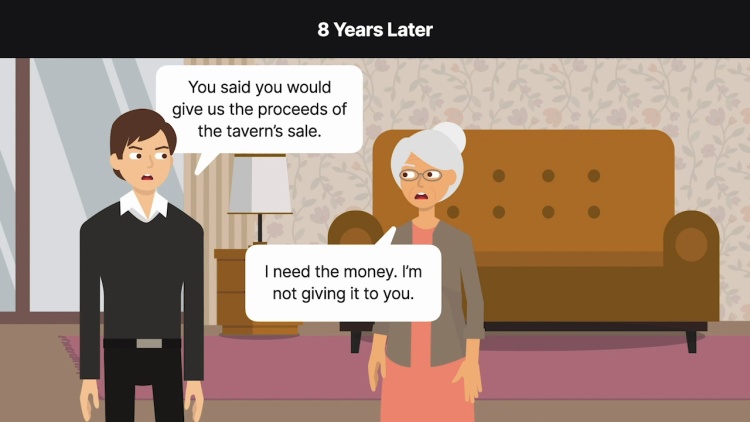Goodman v. Goodman
Washington Supreme Court
128 Wash. 2d 366, 907 P.2d 290 (1995)
- Written by Mary Pfotenhauer, JD
Facts
Clive Goodman died without a will. He was survived by his mother, Gladys Goodman, his first wife, Shirley Golden, and by Clive and Shirley’s children, including their son, Scott Goodman. Before he died, Clive transferred his assets to Gladys. Several years after Clive’s death, when Scott was 25 years old, Scott asked Gladys for money from Clive’s assets, which she refused to give him. Scott (plaintiff) brought suit against Gladys (defendant), arguing that Clive had intended Gladys to hold Clive’s property in trust for the benefit of his children until they reached the age of majority or were old enough to manage the property. Shirley testified that Clive told her he wanted his children to have his property when his children were old enough to responsibly manage it. Shirley also testified that Gladys told her that Clive’s children would get their money when they were older. The jury found that Gladys held the property in trust for the benefit of Clive’s children. The trial court entered judgment notwithstanding the verdict in favor of Gladys, holding that because the suit had been brought more than three years after the last of Clive’s children turned eighteen, the three-year statute of limitations had run. The court of appeals affirmed, and Scott appealed.
Rule of Law
Issue
Holding and Reasoning (Johnson, J.)
What to do next…
Here's why 907,000 law students have relied on our case briefs:
- Written by law professors and practitioners, not other law students. 47,100 briefs, keyed to 996 casebooks. Top-notch customer support.
- The right amount of information, includes the facts, issues, rule of law, holding and reasoning, and any concurrences and dissents.
- Access in your classes, works on your mobile and tablet. Massive library of related video lessons and high quality multiple-choice questions.
- Easy to use, uniform format for every case brief. Written in plain English, not in legalese. Our briefs summarize and simplify; they don’t just repeat the court’s language.





